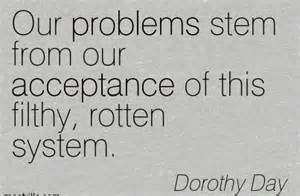In a recent interview, Chris Hedges criticized Pope Francis for not being radical enough in his criticism of capitalism. He said that in the end, the pope was merely advocating charity and not real systemic change.
Hedges is an award-winning journalist, activist, author, and Presbyterian minister. He is one of our culture's most courageous writers and prophetic critics. He is always worth listening to. So I was surprised by his remarks.
The interview gave the impression that the pope not only should have been stronger in his criticism of capitalism; he should have denounced it as such, and offered some alternative.
My personal response is that the pope actually has done all three -- during his six-day trip to the United States, and especially in his landmark encyclical, Laudato Si'. During his visit here, he offered an extremely harsh denunciation of capitalism. He scathingly criticized its "American" embodiment as violent and a form of gangsterism. And finally, in Laudato Si', he presented a workable alternative.
Think about the pope's criticism of capitalism-as-we-know-it.
Begin by understanding that it is historically short-sighted to argue that something called "capitalism" actually exists and needs reformation. The system has long since been reformed. In the midst of the Great Depression, it became clear to everyone that capitalism in its pure form (private ownership of the means of production, free and open markets, and unlimited earnings) was simply not workable.
So under the influence of John Maynard Keynes and others, the New Deal in the U.S. and the more extensive welfare states of Europe incorporated elements of socialism (public ownership of the means of production, controlled markets, and limited earnings). In other words, economies became mixed (some private ownership and some public, some controlled markets and some free, and earnings limited by progressive income tax).
The problem is that the new mixed economy was blended in favor of the rich. The theory was "trickle-down." If the rich prospered, the rising tide of their prosperity would lift all boats.
Another problem surfaced with the Reagan and Thatcher counter-revolutions during the 1980s. Reagan called the New Deal a "fifty-year mistake." So he focused on eliminating or shrinking the elements of socialism that had crept into economies everywhere since the emergence of the welfare state. It's that counter-reformation that Pope Francis has criticized in polite terms as the excrement of evil personified.
He elaborated his point during his address to the U.S. Congress on September 24thwhen he referred to economic system we know as "filthy," "rotten," and "putrid." He called the Wall Street speculators "hypocrites." Moreover, the pope directly confronted the members of his audience by calling the system they represented "the greatest purveyor of violence" in the world today. And he called the politicians seated before him a bunch of gangsters.
Yes he did.
Of course the polite, soft-spoken, and gentle pontiff was a gracious enough guest to do none of those things directly. He did so instead by offering Dorothy Day, Martin Luther King and Thomas Merton as embodiments of our country's greatest values.
It was Dorothy Day who is remembered as saying, "We need to overthrow . . . this rotten, decadent, putrid industrial capitalist system which breeds such suffering in the whited sepulcher of New York."
It was King who called the United States itself, "the greatest purveyor of violence in the world today."
And it was Thomas Merton, the apostle of non-violence, who classified U.S. politicians and military leaders among the world's gangsters when he said, "The world is full of great criminals with enormous power, and they are in a death struggle with each other. It is a huge gang battle . . ."
(Note: You can view every article as one long page if you sign up as an Advocate Member, or higher).






